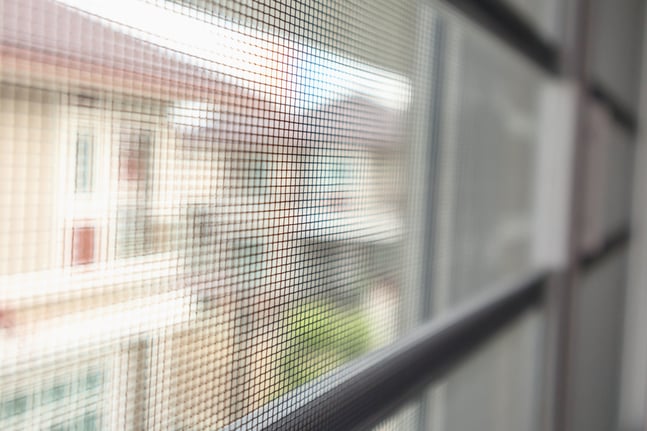On a hot summer day, an open window or door goes a long way to help keep a space cool.
But while providing air circulation and some relief from the heat, that opening becomes problematic when what’s outside starts making its way inside. For insects, birds, leaves, and large allergens (e.g. those puffballs from a cottonwood tree), an open window or door is an open invitation into a building.
A solution for wide-open windows dating back to the late 1800s, screens keep an element of separation from the great outdoors. Like most window accessories, screens are not a one-size-fits-all product. There are several different types of window screens, each boasting different benefits for your commercial project.
5 Types of Window Screens
A window screen’s mesh material makes a big difference in selecting a mesh that lets you actually enjoy an open window. Of the different types of screens on the market -- all of which prevent pests from entering a space without significantly impeding airflow -- the most popular types of screens include:
- Aluminum
- Fiberglass
- Polyester
- Stainless steel
- Copper-bronze and brass
Have a window or door that needs a screen?
Explore our available window screen options and pricing:
1. Aluminum Screens
Sturdy and strong, aluminum screens are as functional as they are long-lasting.
Boasting durability and low weight, this window screen material type allows for both air and natural light to freely enter a space. At the same time, aluminum screens require minimal maintenance and cleaning and resist rust and corrosion.
Of the different types of metal screens, aluminum window screens are the most common. They come in traditional silver or a charcoal finish.
Because of their reflectivity, silver aluminum screens reduce visibility into a space -- an important consideration for those who want a privacy window screen mesh.
2. Fiberglass Screens
One of the most popular screen types for residential windows and doors, fiberglass window screens are designed for function.
Allowing air to flow into a room with little obstruction, fiberglass screens, such as Phifer’s UltraVue, also keep unwanted outdoor nuisances (insects) where they belong: outside.
Though a cheaper option than other window screen materials, fiberglass mesh screens can still resist certain types of damage during their useful life, such as:
- Dents
- UV ray degradation
- Rot and decay
- Brittleness from extreme temperatures
What sets fiberglass screens apart is their flexibility. When pushed against, fiberglass mesh stretches without immediately tearing. Its pliability preserves your investment.
As most fiberglass screens have a protective coating -- usually black -- they do filter sunlight more than other screens. With less sunlight entering a space, a room stays cooler.
3. Polyester
Another non-metal window mesh, polyester screens rank higher on the durability front.
While more expensive than fiberglass screens, polyester screens are worth the extra investment. During manufacturing, polyester screens are covered with a vinyl coating that upgrades their resistance to cuts and rips. Compared to fiberglass, polyester screens are approximately 7x stronger.
Under normal use, polyester screens are almost impossible to tear without a cutting tool. That’s why they’re ideal in homes with pets -- an overly enthusiastic dog or cat won’t be able to easily damage the screen.
4. Stainless Steel
For screens installed in high-traffic areas or frequently used commercial windows and doors, resilience is a must.
Stainless steel screens represent a long-term investment in integrity. Made from one of the strongest metals, these durable window screens stand up to the most common damages to screens, such as:
- Scratches
- Stretching
- Rips
- Corrosion
Even after years of exposure to the elements, stainless steel screens remain as rigid as the day they were installed. In addition to durability, stainless steel screens, such as SeeVue Insect Screen, deliver what you expect from a window mesh:
- Airflow
- A barrier for insects and other nuisances
- An almost unobstructed view of the outside
When manufactured with a thicker-gauge mesh, stainless steel screens provide enhanced security. Tough to cut through and able to withstand impacts, this heavy-duty window screen material stops unwanted intrusions.
5. Copper-Bronze & Brass
Considered specialty window screens, mesh screens made from copper-bronze and brass combine utility and design.
Primarily meant for aesthetic purposes, these screens add a pop of color to a window while still providing ventilation and a see-through barrier to the outside. Both types of screens are commonly used in period homes and historic restorations.
In addition to being visually appealing, copper-bronze and brass screens are rust-resistant, strong, and long-lasting.
Mesh & Strand Size for Screen Performance
While selecting the appropriate screen material is an important consideration for meeting application demands, so too are a screen’s mesh and strand size. Both factors impact a screen’s performance.
Screen mesh size is a measurement of the holes in a screen. A smaller mesh size means fewer things get through -- including air and light.
Strand size refers to the diameter of each wire comprising a screen mesh. A thicker strand size means more strength and durability. At the same time, thicker strands equal less outward visibility.
Getting the Most From Your Mesh Window Screens
An almost standard part of any window, a screen lets you fully enjoy natural air circulation without having to worry about unpleasant elements from outside getting in. By choosing the right window mesh screen for your commercial project, your screens can do more than keep pests out while letting air in.
Looking for a partner for your next commercial project?
Check out New Angle Beveling's services and capabilities.
(Editor's note: This article was originally published in June 2021 and was recently updated).





